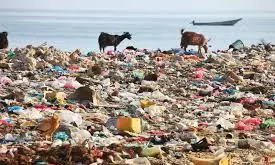
How to save the Earth from plastic?
text_fieldsPlastic has now become an inalienable part of everyday life. From the toothbrush in the morning to the blankets pulled at night, people use products made from synthetic/plastic materials in some form or another. The once ubiquitous natural materials are now being replaced by synthetic/plastic products. Plastic has taken over every part of daily life including what used to be cloth bags, paper packets of food and non-food items, cotton mattresses, metals used in appliances, and even medicine bottles. Due to its ease and affordable cost, people abandoned old habits and compulsions and embraced plastic.
Also read: Oman to enforce strict ban on plastic bags from September
But the eco-conscious community of science and technology sees plastic as a villain. Setting apart a small percentage that can be recycled after use, the rest of the plastic cannot be absorbed by the earth. Instead if it is burned, toxic gases will pollute the atmosphere. It is in this scenario that an internationally organized effort came in the picture to reduce and gradually eliminate plastic use globally. The fifth meeting of the Intergovernmental Consultative Committee (INC) on Plastics, initiated by the UN itself, was held from November 25 to December 1 in Busan, South Korea, which was along the lines of the annual UN-led Conference of Parties (COP) on global warming. However the Busan conclave of 170-nation conference failed to reach a consensus on a 'Global Plastics Pact' to end plastic pollution, despite lengthy discussions and multiple extensions of its conclusion.
Also read: Dubai Can slashes 18 million plastic bottles in 2 years
Nations have come together five times in these international initiatives since 2022. An agreement was scheduled to be signed before the end of 2024. Many countries are in favor of recycling plastics and banning some types, but not all issues could be agreed upon. For example, India has banned 22 types of single-use plastic items from 2022. However, when it comes to restrictions on the production of plastic products India could not sign up to it. Ours is an economy that exports huge quantities of polymer products, given the size of the market. Government institutions themselves are at the forefront of production along with giant monopolies like Reliance; the LDPE production alone of Reliance was 1.1 million tonnes per annum until two years ago.
Also read: Two-thirds of marine animals have microplastics in tissues: study
According to a UNEP fact sheet released in 2000, plastic pollution tripled between 1970 and 1990. There was more pollution in just one decade before 2000 than in the 40 years before that. These are just examples. Along with this, despite the bans, plastic production and consumption are increasing. Globally, of the seven billion ton of plastic waste, only less than 10 percent is recycled. At least some relief from pollution can be achieved if stringent controls are put in place to reduce consumption along with control in production. 85 percent of single-use plastic waste ends up in water bodies and fields. In addition, the primary source of plastic is fossil fuel from the bottom. That being the case, nations are trying to drastically reduce the use of fossil fuels globally and to switch to alternative sources of energy instead.
Also read: Forest officer shares video of tiger inspecting plastic bag, asks people to be responsible
Around 100 countries meeting in Busan are in favor of collective decision-making on restrictions, but countries including India and China are opposed to decision-making by majority. Giant producer and consumer countries have their own interests for reasons such as freedom of production and their economy. Moreover, the plastic forum, like the 'COP', insists on all countries being unanimous to the last letter of a document. Such was the experience of COP29 in Baku, Azerbaijan in mid-November. So the possibility of an immediate formula of global solution is quite distant. However, people can also take some initiative. Lifestyle modifications can reduce consumption and thus, the production of plastic. From using alternative materials for food packaging to replacing single-use shaving sticks with inserted blades, multinational manufacturers and, in turn consumers must prepare for the transition. Shifting the onus of saving the Earth on other people's shoulders can be a knee-jerk solution. But who wouldn't want to ensure at least a little better earth and air for their own future offspring!
Also read: Scientists create recyclable, not-from-crude-oil plastic











